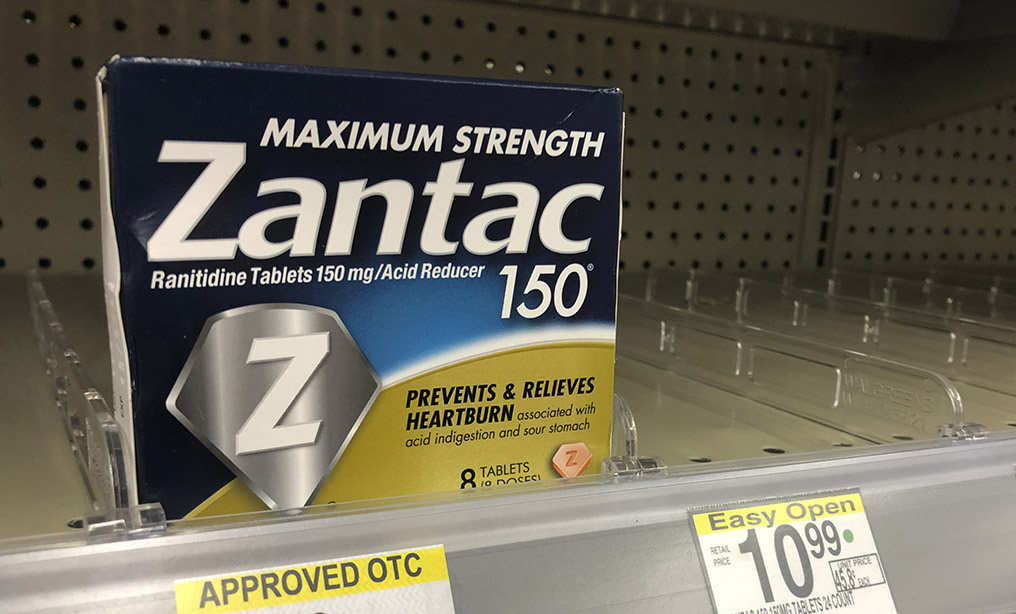FDA Action on Zantac Shows 'Lack of Confidence' in Drug's Safety, Say Lawyers Eyeing Suits
According to Jason Zweig of Hagens Berman Sobol Shapiro, the science linking Zantac and the carcinogenic molecule has been clear, so even without the FDA's recent move, causation would be solid.
April 03, 2020 at 02:30 PM
6 minute read
 A box of Zantac tablets. On April 1 health regulators told drugmakers to immediately pull their popular heartburn drugs off the market. AP Photo: Wilfredo Lee
A box of Zantac tablets. On April 1 health regulators told drugmakers to immediately pull their popular heartburn drugs off the market. AP Photo: Wilfredo Lee
Attorneys eyeing lawsuits over Zantac may be divided on the significance of the U.S. Food and Drug Administration's decision calling on drugmakers to pull the heartburn medication from the market, but all agree the move highlights what appears to be a growing unease over the safety of the medication.
On Wednesday, the regulatory body announced it was requesting manufacturers to withdraw all prescription and over-the-counter Zantac from the market over concerns that a potentially carcinogenic molecule in the drug may build up over time if the medication is stored above room temperature. According to a press release issued Wednesday, the move is part of an ongoing investigation into the molecule N-Nitrosodimethylamine, or NDMA, which is a component of the drug.
"We didn't observe unacceptable levels of NDMA in many of the samples that we tested. However, since we don't know how or for how long the product might have been stored, we decided that it should not be available to consumers and patients unless its quality can be assured," Janet Woodcock, director at the FDA's Center for Drug Evaluation and Research, said.
Litigation over the drug had already been brewing several months before the FDA's recent announcement. Lawsuits raising both personal injury and economic loss claims had been lodged in courthouses across the state, and in February nearly 150 lawsuits were consolidated into a multidistrict litigation in the U.S. District Court for the Southern District of Florida.
Although some attorneys said the FDA's move likely would not have a significant impact on how the lawsuits proceed, one of the leading attorneys in the litigation said the regulator's decision could be a "game-changer."
Brent Wisner, a Los Angeles-based partner in Baum, Hedlund, Aristei & Goldman, said that, before the announcement, the FDA was "protective" of the drug and dismissive of claims about its potential risks. That support could have provided powerful ammunition in the defenses' arsenal, but, with the FDA now agreeing that the drug is unsafe, that firepower has been removed.
"It takes the FDA out of the equation, out of the litigation, and it really strengthens the plaintiff's case," he said.
Wisner added that the FDA's concerns about the way NDMA builds up in the medication while it sits on the shelves could also significantly impact the litigation, because now it potentially widens the scope of possible defendants to any store that has shelved the drug.
"The reason for it's removal is what is so powerful. It's not that there's a new way of manufacturing it. … The FDA is removing the molecule from the market because it is inherently unsafe," he said. "These companies are now all on the hook, and all have exposure. I think the number of potential defendants in this litigation is going to increase dramatically."
Given that the drug has been on the market since 1983 and that there are millions of customers of Zantac, plaintiffs attorneys are predicting that the litigation will be enormous. Wisner said that, with such a large pool of plaintiffs, having a significant number of defendants will be key to ensuring a successful result for such a large group.
"I think it's a real game-changer," he said. "It's going to dramatically increase the size and scope."
So far, the litigation has focused on four drugmakers, two of which have already recalled the drug. In early October, GlaxoSmithKline recalled prescription Zantac and a few days later Sanofi announced its voluntary recall of over-the-counter Zantac. Earlier that month, preliminary tests by the FDA had showed "unacceptable levels" of NDMA in some samples of ranitidine, which is an active molecule in Zantac.
Not all attorneys, however, agreed about how significant the FDA's move will be.
Jason Zweig of Hagens Berman Sobol Shapiro, who is also a leading attorney in the litigation and is pursing both economic loss class actions and personal injury cases now in the MDL, said the FDA's move is likely to get significant media attention, which could lead to additional cases being filed.
However, in terms of strengthening the claims, he said he felt it was only a matter of time before the FDA decided to pull the drug from the market.
"The only surprise for me was the amount of time it took the FDA to get there," he said. "We've had zero doubts that this drug would be pulled off the market."
According to Zweig, who works out of Hagens Berman's Chicago and New York offices, the science linking Zantac and the carcinogenic molecule has been clear, so even without the FDA's recent move, causation would be solid.
"It's just validation of what we've been saying all along," he said. "This is just an inherently unstable drug and it has no business being in the marketplace."
Kline & Specter attorney Shanin Specter, who has led several personal injury mass actions against drug companies, agreed that the litigation will be most significantly dictated by the science. Specter, who is based in Philadelphia, said his firm has several clients who took Zantac and later developed cancer and is evaluating their cases. The firm, he said, is closely watching studies being conducted by Sloan Kettering and elsewhere over the drug, and said those findings, more than anything from the FDA, will drive the MDL.
"The FDA's direction is important, sure, but in the context of the voluntary withdrawal from the market by many pharmaceutical companies and the withdrawal of Zantac from the store shelves by many retailers, it is just one more indication that there's a lack of confidence in the safety of the product," Specter said. "We need to see some hard science here in order the satisfy judges and juries about the causative relationship between ingestion of Zantac and a variety of cancers."
A statement from Sanofi spokesman Nicolas Kressmann noted the company's voluntary recall, but said it stood behind the science showing the drug is safe.
"We take this issue seriously and continue to work closely with the FDA to evaluate any potential safety risks associated with Zantac," Kressmann said. "At Sanofi, we stand by the long-standing science that supports the safety of Zantac OTC products, which have been used by consumers for over two decades."
Sanofi is a French company with U.S. operations headquartered in Bridgewater, New Jersey.
U.K.-based GlaxoSmithKline did not return a message seeking comment.
This content has been archived. It is available through our partners, LexisNexis® and Bloomberg Law.
To view this content, please continue to their sites.
Not a Lexis Subscriber?
Subscribe Now
Not a Bloomberg Law Subscriber?
Subscribe Now
NOT FOR REPRINT
© 2025 ALM Global, LLC, All Rights Reserved. Request academic re-use from www.copyright.com. All other uses, submit a request to [email protected]. For more information visit Asset & Logo Licensing.
You Might Like
View All
Ozempic Defendants Seek to Shave 'Tacked On' Claims From MDL Complaint
3 minute read
Plaintiff Argues Jury's $22M Punitive Damages Finding Undermines J&J's Talc Trial Win
4 minute read
'Discordant Dots': Why Phila. Zantac Judge Rejected Bid for His Recusal
3 minute read
Pittsburgh Jury Tries to Award $22M Against J&J in Talc Case Despite Handing Up Defense Verdict
4 minute readLaw Firms Mentioned
Trending Stories
- 1How I Made Partner: 'Take Every Opportunity to Get Involved in the Business Side of the Firm,' Says Alyssa Domzal of Ballard Spahr
- 2People in the News—Feb. 5, 2025—Eckert Seamans, Rawle & Henderson
- 3Librarian's Termination Violated First Amendment Protections, Lawsuit Claims
- 4Choice-of-Law Issues as the UCC 2022 Amendments Come into Effect
- 5Six Benefits of Taking an Opposing Medical Expert’s Deposition
Who Got The Work
J. Brugh Lower of Gibbons has entered an appearance for industrial equipment supplier Devco Corporation in a pending trademark infringement lawsuit. The suit, accusing the defendant of selling knock-off Graco products, was filed Dec. 18 in New Jersey District Court by Rivkin Radler on behalf of Graco Inc. and Graco Minnesota. The case, assigned to U.S. District Judge Zahid N. Quraishi, is 3:24-cv-11294, Graco Inc. et al v. Devco Corporation.
Who Got The Work
Rebecca Maller-Stein and Kent A. Yalowitz of Arnold & Porter Kaye Scholer have entered their appearances for Hanaco Venture Capital and its executives, Lior Prosor and David Frankel, in a pending securities lawsuit. The action, filed on Dec. 24 in New York Southern District Court by Zell, Aron & Co. on behalf of Goldeneye Advisors, accuses the defendants of negligently and fraudulently managing the plaintiff's $1 million investment. The case, assigned to U.S. District Judge Vernon S. Broderick, is 1:24-cv-09918, Goldeneye Advisors, LLC v. Hanaco Venture Capital, Ltd. et al.
Who Got The Work
Attorneys from A&O Shearman has stepped in as defense counsel for Toronto-Dominion Bank and other defendants in a pending securities class action. The suit, filed Dec. 11 in New York Southern District Court by Bleichmar Fonti & Auld, accuses the defendants of concealing the bank's 'pervasive' deficiencies in regards to its compliance with the Bank Secrecy Act and the quality of its anti-money laundering controls. The case, assigned to U.S. District Judge Arun Subramanian, is 1:24-cv-09445, Gonzalez v. The Toronto-Dominion Bank et al.
Who Got The Work
Crown Castle International, a Pennsylvania company providing shared communications infrastructure, has turned to Luke D. Wolf of Gordon Rees Scully Mansukhani to fend off a pending breach-of-contract lawsuit. The court action, filed Nov. 25 in Michigan Eastern District Court by Hooper Hathaway PC on behalf of The Town Residences LLC, accuses Crown Castle of failing to transfer approximately $30,000 in utility payments from T-Mobile in breach of a roof-top lease and assignment agreement. The case, assigned to U.S. District Judge Susan K. Declercq, is 2:24-cv-13131, The Town Residences LLC v. T-Mobile US, Inc. et al.
Who Got The Work
Wilfred P. Coronato and Daniel M. Schwartz of McCarter & English have stepped in as defense counsel to Electrolux Home Products Inc. in a pending product liability lawsuit. The court action, filed Nov. 26 in New York Eastern District Court by Poulos Lopiccolo PC and Nagel Rice LLP on behalf of David Stern, alleges that the defendant's refrigerators’ drawers and shelving repeatedly break and fall apart within months after purchase. The case, assigned to U.S. District Judge Joan M. Azrack, is 2:24-cv-08204, Stern v. Electrolux Home Products, Inc.
Featured Firms
Law Offices of Gary Martin Hays & Associates, P.C.
(470) 294-1674
Law Offices of Mark E. Salomone
(857) 444-6468
Smith & Hassler
(713) 739-1250





